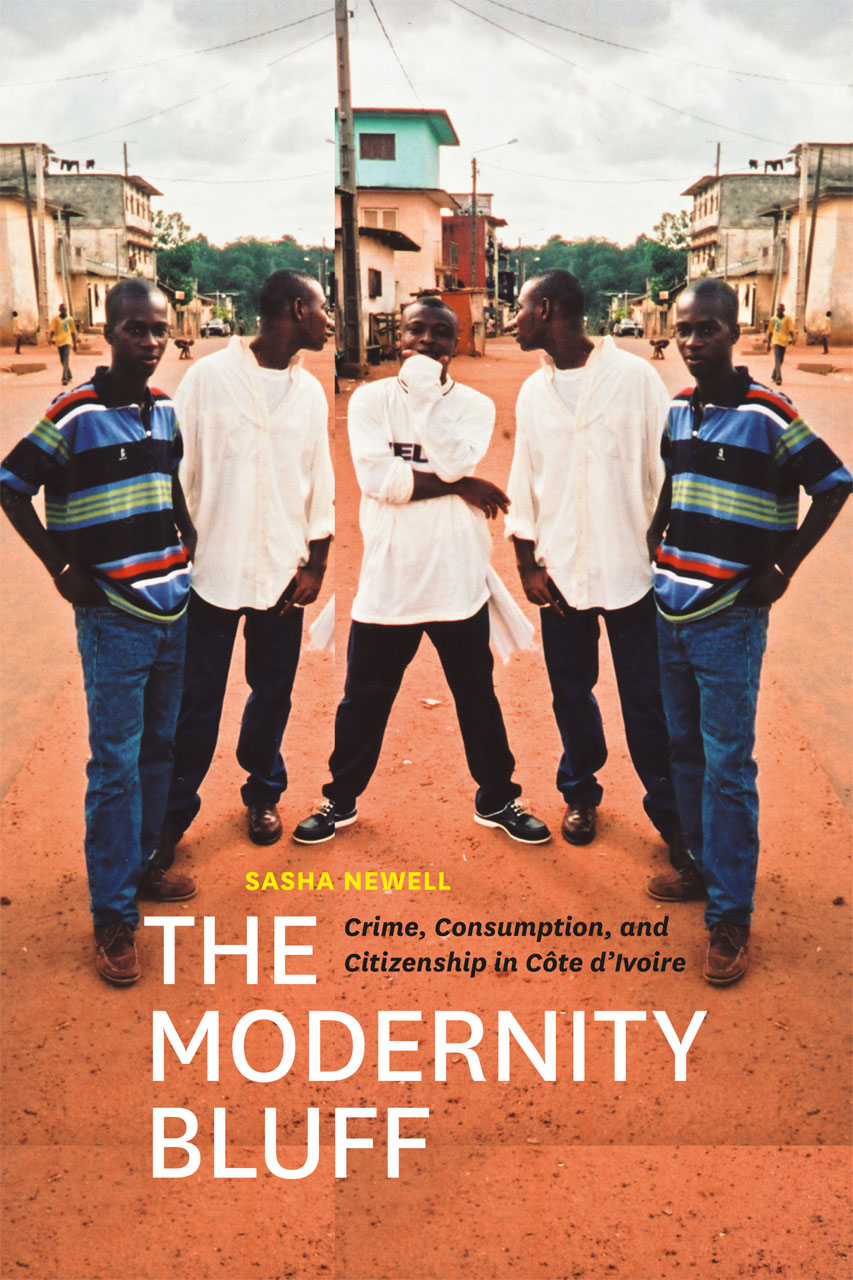Sasha Newell. 2012. The Modernity Bluff: Crime, Consumption, and Citizenship in Côte d’Ivoire. Chicago and London: The University of Chicago Press. 305 pp. [original source: African Studies Quarterly | Volume 14, Issue 3 | March 2014; pp. 143-145]
Sasha Newell’s The Modernity Bluff starts out by pulling the reader into one of Abidjan’s typical outdoor bars where, around tables fully covered with bottles, groups of young men lavishly outspend each other. They flash rolls of money, prominently display their cell phones, and exhibit their prestigious US brand name clothing in the most refined ways. We witness a bluff: many of those indulging in seemingly unlimited consumption that night “would struggle to find enough money to feed themselves the next day” (p. 2). What follows is an extraordinary account of how such bluffing makes sense in the Ivoirian context. Newell delineates in its most intricate details how the fakery of being wealthy and the performance of being “modern“ (i.e. “Westernized“) are of constitutive importance to such diverse phenomena as street language (chapter 1), the illicit urban economy (chapter 2), masculinity and social cohesion (chapter 3), consumption (chapter 4), migration (chapter 5), and the Ivoirian political crisis (chapter 6).
Newell does not discard bluffing as unauthentic. He seeks to analyze the relations between the bluffer and the audience to show how the bluff intertwines the real and the imaginary. Through the copious use of rich ethnographic data, he hopes to demonstrate that appearances of “modern“ success fortify one’s social networks and thereby convey “real“ success, and that the quest for appearing modern and successful has replaced the quest for “being“ successful amongst urban youth in Côte d’Ivoire. Mind the inverted commas: in his conclusion, Newell challenges the normative differentiation between the real and the fake and argues that modernity itself is founded on bluffing in the first place. “The modernity bluff therefore is neither fake nor real, but rather the ability to produce the real through manipulation of the imaginary” (p. 261).
What deserves particular acknowledgement is, maybe unsurprisingly, the form of Newell’s argumentation throughout the book. First and foremost, the author develops a captivating proximity to the people, places, and phenomena under study, which he conveys through detailed anecdotes, extensive and intriguing quotations of his friends and acquaintances in Abidjan, pop song lyrics, Ivoirian cartoons, and expressive photographs. Secondly, as much as Newell obviously immersed himself in the milieu he studies, he consistently steps back to situate his ethnographic accounts carefully within their larger context, tracing the history of the phenomena and the etymology of the concepts he studies, critically cross-checking different narratives and addressing their contradictions, and ordering the diversity and ambivalence of his topic through lists, typologies, and comparisons. Third and finally, Newell is a stunningly skillful theorist, opening up new perspectives on the political crisis in Côte d’Ivoire, transnationalism, brands and consumption, to name but a few issues at stake. And while his cross-referencing between empirical and theoretical observations and between social theory classics and contemporary Africanist writing can be dazzling at times, it never appears heavy or lofty.
Persuasively, The Modernity Bluff thus creates a suspicion against itself: could the reader not be duped by a brilliant bluffeur? The suspicion surfaces in sections where the author seems to play with the bluff’s inherent ambivalence as a stylistic device (e.g. when we read about the bluffeurs’ ‘true’ selves on p. 140; inverted commas in original), and concerns more substantially his diverse conceptualizations of modernity that are not accordingly mirrored in his empirical accounts. Generally, Newell interprets Ivoirians’ ubiquitous reference to a Western locus of power through their ideas about cosmology, consumption, and fakery; modernity is considered a culturally specific construction. While he also emphasizes the ideological, exclusive character of modernity (“the West is modern, the rest is not“), his descriptions of Ivoirian “modern“ youth one-sidedly concentrate on the situational inclusion and creative appropriation of modernity, and the “ability to make real through appearance, if only temporarily, what was otherwise merely the reverie of desire” (p. 139).
Another surprising analytical blank space concerns Newell’s fieldwork. Notwithstanding a few methodological remarks and interesting anecdotes, the author never really harnesses the empirical data of his experiences as a white, American researcher (who was, for instance, often perceived as a modern accessory to his Ivoirian friends). In many ways, a more reflexive elaboration on the intercultural aspects of fieldwork could have been helpful to empirically ground Newell’s fascinating insights on cultural specificities and cultural hybridization. Finally, the reader is left wanting a conclusion about the epistemological consequences of Newell’s findings. In fact, if culture and modernity are based on bluff, what about anthropology? Whatever the answer to this question may be and despite the ambiguity that it might intend to produce, Newell’s Modernity Bluff is clearly a magnificently written, and thoroughly researched work. Accomplishing its ambitious objective to “recast anthropological theories of the relationship between mimesis, modernity and postcolonial identity” (p. 5), it will undoubtedly continue to spark new debates in anthropological and Africanist circles for quite a while.
Joschka Philipps, Centre for African Studies Basel, Switzerland
Joschka Philipps is a PhD candidate at the Centre for African Studies Basel, Switzerland. His award-winning study on youth gangs and urban protests in Conakry, Guinea has recently been published in English and French by L’Harmattan, Paris. In his doctoral research, Joschka compares youth collectives involved in urban protests in Conakry, Guinea and Kampala, Uganda. Follow Joschka Philipps on Twitter: www.twitter.com/JoschkaPhilipps.

Leave a Reply